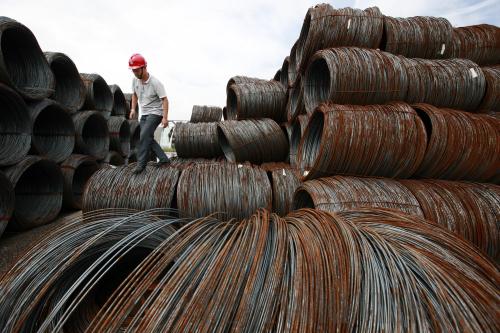|
 |
|
CUTTING REDUNDANCE: A staff member stands on a band of rusted coil at an iron and steel plant in Huaibei, Anhui Province. China is intensifying plans to reduce excess capacity in several industries (CFP) |
BBMG Corp. is a large cement producer listed on China's stock market. Two of its subsidiaries are being eliminated because the Ministry of Industry and Information Technology (MIIT) has deemed their capacity excessive.
"We will, in accordance with the MIIT's requirements, pull down the two subsidies by the end of September. The eliminated capacity only accounts for a small proportion of the corporation's total capacity, therefore the performance of the corporation will not be affected," said a BBMG statement.
According to its 2013 semi-annual report, BBMG now has a cement production capacity of 45 million tons, while each of the two subsidies to be shut down only has 100,000 tons of production capacity.
The MIIT publicized on July 25 a list of companies at overcapacity to be shut down, including 1,294 enterprises in 19 industries. The ministry ordered the closures by the end of September and said production should not be transferred to other regions.
Industries such as cement, steel, electrolytic aluminum, ferroalloy, copper smelting, chemical fiber and papermaking are among those required to cut surplus capacity. Altogether 527 enterprises in the cement industry are on the list. Alcohol, gourmet powder, citric acid and lead-acid battery were previously not key sectors of excess capacity but have now been included on the list.
China has been shutting down companies in overcapacity for a decade. When the plan began in 2003, only three industries were targeted—steel, cement and electrolytic aluminum. Today the list is five times longer.
Wang Yong, a researcher with CITIC Securities Co. Ltd., said announcing the list of enterprises to be shut down shows the government's resolve to reduce excess capacity.
Although the Chinese Government has made several attempts to tackle the problem of overcapacity in the past, it had little success, said Wang. This time might be some different because the new term of government is keen on advancing economic reforms and tolerating slower economic growth.
Upgrading industry
"Among all the problems the Chinese economy is facing, overcapacity is at the top," says Wang. "In some industries the problem has been quite serious, causing low prices and reducing the profits of enterprises," Wang said.
Take the cement industry for example. It has been a key sector in the government's past efforts to eliminate overcapacity. But production has not slowed. In 2009 capacity stood at 800 million tons, but at the end of 2012 the figure rose to 2.9 billion tons, with 75 percent actually being used.
Owing to the overcapacity and intensified competition among companies in excess capacity, the 25 listed cement companies, including BBMG, are suffering profit declines. Some of them even partially suspended production because of huge losses.
| 